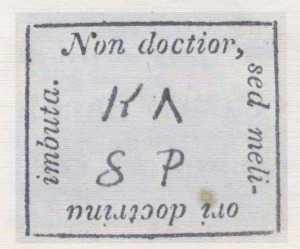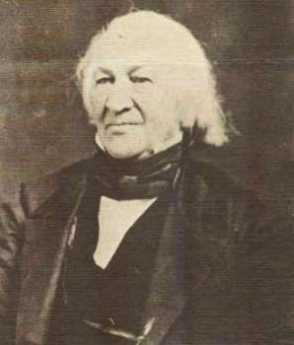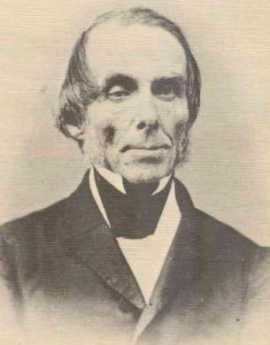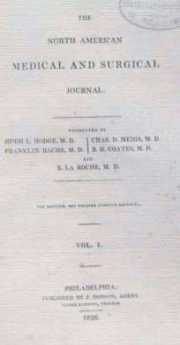Related Topics
Philadelphia Physicians
Philadelphia dominated the medical profession so long that it's hard to distinguish between local traditions and national ones. The distinctive feature is that in Philadelphia you must be a real doctor before you become a mere specialist.
The Kappa Lambda Society of Hippocrates
Philosophical Hall
February 5th 1835, 3 1/2 PM
A special meeting of the Kappa Lambda was convened this afternoon by order of the President, Dr. Otto, at the request of Drs. Bache, Bond, and Wood for the purpose of settling and closing the concerns of the institution ....
Resolved that the Secretary be requested to transfer to the College of Physicians, for safe keeping, With the consent of that body, Journal of Proceedings and other manuscript documents of the Kappa Lambda Society to be deposited in the Archives of the College ....
Philosophical Hall
February l Sth 1835, 3 1/2 PM
.... Resolved that from and after the termination of this meeting the Kappa Lambda Society of Philadelphia be held to be dissolved.
Resolved that the foregoing minutes of the present meeting be now read, which being done, they are unanimously approved.
On Motion adjourned sine die.
Henry Bond, Secy,
WITH these resolutions, the Philadelphia branch of the Kappa Lambda Society of Hippocrates transferred its organizational records to the College of Physicians of Philadelphia and then dissolved itself.
What was the Kappa Lambda Society of Hippocrates?
- An elitist clique dedicated to the advancement of its membership?
- A secret fraternal order?
- A scientific society that published one of America's most important medical journals?
- A society for the moral reform of medicine?
- A society for reviving the Hippocratic Oath?
- A society dedicated to the replacement of Hippocratic ethics with Thomas Percival's code of medical ethics?
- A medical society that served as the prototype for the American Medical Association?
- A failure from which the founders of the AMA learned how not to organize a national medical organization?

|
|
Seal of the Philadelphia chapter of the Kappa Lambda Society |
The answer that seems to emerge from the books, ledgers, and correspondence that the Philadelphia branch of Kappa Lambda transferred to the College of Physicians of Philadelphia 1835 is that the Philadelphia chapter was all of the above. Yet the only three scholars who have written about the society -- Chauncey Leake (1922), Lee Van Antwerp (l945), Philip van Ingen (1945) -- have tended to view it as only some of the above, casting Kappa Lambda as either "elf" or more commonly, as Van Antwerp marks, as an "ogre".

|
| Samuel Jackson, M.D. |
The Kappa Lambda Society began as a secret fraternal order whose members swore a version of the Hippocratic Oath, pledged to upload the honor of the medical profession, and promised to keep the existence of the society a secret. The earliest known records of the society are from Lexington, Kentucky, and date from 1820. But, as Van Ingen has suggested, the history of society is considerably older. What appears to have happened in Lexington was that, in 1820, Dr. Samuel Brown (1769-1830), as professor of medicine, became head of the local chapter of Kappa Lambda. Under his leadership, this chapter committed itself to the moral reform of American medicine and took as its objective the idea of having American doctors pledge themselves to adhere to the code of conduct that Dr. Thomas Percival (1740-1804) had published in 1803 under the title Medical Ethics. To implement these reforms the Lexington chapter of the Kappa Lambda Society of Hippocrates published the first American edition of Percival's code of ethics, Extracts from Medical Ethics or A Code of Institutes and Precepts, Adapted to the Professional Conducts of Physicians & Surgeons in Private or General Practice (1821),and sought to establish new chapters of Kappa Lambda, whose members would pledge to adhere to the standards of conduct delineated in Percival's code.
When Dr. Brown went forth to spread the new Perivalean gospel, he found willing adherents in Philadelphia, where Samuel Jackson and seven other physicians (Franklin Bache, J.H.Gordon, Thomas Harris, Thomas T. Hewson, Hugh L. Hodge, Charlie D. Meigs, and Rene' La Roche)agreed to found a chapter. The Philadelphia constitution required all members to adhere to Percival's code of medical ethics and designated several members as "Guardians" with "the duty of preserving concord among all the members of the society, by arbitrating in all disputes referred to them, and prescribing the kind of reparation to be made .... (and) report(ing) ... whatever they may deem derogatory to its dignity and usefulness, in the misconduct of its members." The Philadelphia chapter of Kappa Lambda was thus to be a self-policing medical community that would abide by laws (stated in Percival's Medical Ethics) and that had guardians to police and enforce these laws.
Philadelphia may have been the only chapter of Kappa Lambda to take Dr. Brown's commitment to a self-policing moral community seriously. His ideas had been awkwardly juxtaposed on top of the original conception of Kappa Lambda as a secret fraternal order. The Philadelphia struggled with this fundamental tension in drafting their constitution. At the core of the old fraternal order was a secret oath passed down from society to society. Philadelphians were initiated into the society with the following oath:
You (swear/affirm) that you will endeavor to exalt the character of the Medical Profession by a life of virtue and honor--that you will keep the secrets, guard the reputations and advance the interest of the Society and of each of its members; and that you will never encourage anyone to devote himself to the Study of Medicine whose leaning, talents, and honorable qualities are not such as to render him respectable in his Profession, and worthy to be distinguished as a member of this society.
Whatever the original intent of this oath, its fraternal aspects--"advanc[ing] the interests ... of each of (the) members" and excluded from the profession, or at least from its higher ranks, anyone insufficiently virtuous, honorable, learned, or talented to be elected to Kappa Lambda--seem more prominent than its moral commitments.
Each chapter, moreover, was free to develop its own initiation ceremony. The Philadelphians used the ceremony to put a reformist spin on the oath. The following words were to be pronounced by Philadelphia initiates immediately after they read the oath:
The venerable Hippocrates of Cos may be considered as the remote founder of this society and the considered as the remote founder of this Society and the {oath/affirmation} which you have taken is in substance the same as that administered to its members. The influence of this society on the morals and professional demeanor of the physicians of that period is attested to by the most respectable authorities.
Believing that the state of the Profession in this country so imperiously calls for reformation & knowing that we have not that rank and influence in the community, to which as members of a liberal profession we are entitled, we have determined under a solemn sense of duty to associate on just principles for the purpose of elevating the character of our Vocation.
In other words, the oath was simply a ritual reminder of a historical reform movement. One could no longer reform medicine by excluding the unworthy, however, because "unworthy brethren" had already been admitted to the profession and had “humbled†the profession through their “sinister conduct.†The Problem facing the new Hippocrates, the Kappa Lambda, was reforming an already corrupt profession that problem could only b resolved by teaching the profession t associate on "just principles"(i.e., Percival's principles of Medical Ethics).
The need for "just" and benevolent principles of association is restated in the Preamble to the Philadelphia chapter's constitution, to which very member affixed their signature upon joining the organization.
As the bonds of all associations and confederacies by which their parts are firmly and permanently linked together, must be the eternal principles of benevolence and justice-we the undersigned-professing to follow implicitly, desirous of rigidly applying, these principles to our particular situation; uninfluenced by motive of personal ambition, disclaiming any right or wish to infringe on social compact, assume any power, delegate any authority which is incompatible with the religion we profess, the laws of our country or the fair and honourable advancement of our fellow citizen:--do hereby unite and pledge ourselves to be governed by the following constitution, and the laws which may afterwards be framed under it. Nor can we ever be unmindful, that our present efforts, directed to the support of the dignity, and extension of the usefulness of the medical profession, will more readily meet with their successful fulfillment in the encouragement of virtue and science, the pure lights of which must eventually dispel the mists of immorality and ignorance. To this end, we are to engraft medical ethics on moral precept, and sedulously cherish that friendly feeling and courteous conduct, in our professional and social intercourse, which can alone confer happiness on individuals, and promote the welfare of mankind.
With the words "uninfluenced by personal ambition ... [and] disclaiming any right or wish to infringe on ... the fair and honourable advancement of our fellow citizens" the Philadelphia chapter explicitly annulled the self-serving clauses of the traditional Kappa Lambda oath; indeed, by "engraft[ing Percival's] medical ethics on [Hippocratic] moral precept," they had effectively consigned the oath to a purely ceremonial function. The Philadelphia was thus continuing along the path taken by Samuel Brown (who beamed upon the Philadelphia branch and lauded its work), converting a vaguely Hippocratic elitist fraternal order into a society seriously committed to reforming American medicine.
The Philadelphia broke entirely new ground on another issue. Citizens of a city that was the center of the American science, the Philadelphia quite naturally wedded the two distinct ideas of scientific and moral reform into a single progressive union: pledging themselves to "the encouragement" of both "virtue and science" and to dispelling "the mists" of both "immorality and ignorance." Article V of the Philadelphia chapter's constitution made it morally obligatory for "Every member ... to contribute any practical fact, discovery, or view, which, in his opinion, will tend to the improvement of the profession, and the amelioration of the condition of the sick and infirm."

|
| John Bell, M.D. |
Such statements must have been intuitively obvious to the founding members of the Philadelphia chapter. When Samuel Jackson(l787-1872), who is generally credited with writing the constitution, formed the chapter in 1822, he was already professor of material medical at the Philadelphia College of Pharmacy and a member of the American Philosophical Society; by the time the constitution was formally enacted in 1825, he had become professor of the institutes of medicine at the University of Pennsylvania. A year later Franklin Bache (1792-1864) became a professor of chemistry at the Franklin Institute. Similar career patterns are evident in most of the other founding members; Hugh L. Hodge(l836-1881) was a lecturer on the principles of Surgery at the Medical Institute of Philadelphia, and went on to become a professor of obstetrics at the University of Pennsylvania; Charles D. Meigs (1792-1869 had been a member of the Academy of Natural Sciences of Philadelphia, became a member of the American Philosophical Society, and went on to become a professor of obstetrics at the Jefferson Medical College; Rene' la Roche(1795-1872) was a member of the Academy of Natural Sciences and, shortly after the constitution was approved, became a member of the American Philosophical Society.
The Philadelphia' fervor to reform medicine and to advance medical science clashed with the secret fraternal inclinations of traditional Kappa Lambda chapters. First, there was the issue of Percival's Medical Ethics. In 1823, following the precedent set by Dr. Brown, the Philadelphians published 500 copies of a newly revised editions of Percival' code, sending them to older chapters in Baltimore, Lexington, and New York, and distributing three copies to each member of the Philadelphia chapter(who appear to have used the extra copies to recruit new members). A new member, John Bell (1796-1872), was instructed to publish a copy of the Philadelphia edition of Extracts from the Medical Ethics of Percival in the National Gazette. He would later chair a subcommittee that revised and published yet another edition of the Extracts in 1826. As a member of a society committed to abiding by Percival's code, dedicated to disseminating its ideals, and seeking to recruit like-minded physicians, the Philadelphians thought it was perfectly natural to continuously revise and publish new editions of Percival. Yet publication was a disturbingly public activity for a supposedly secret society like Kappa Lambda.
Even more disturbing to the already established non-reform chapters of Kappa Lambda was the Philadelphia chapter's attempt to encourage scientific research by American physicians through The North American Medical and Surgical Journal. A regularly published journal was an event more public enterprise than the sporadic publication of revised editions of Percival's code. The New York chapter was instantly hostile to the idea, demanding that the existence of the Kappa Lambda society be kept secret. The District of Columbia chapter was concerned with the question of secrecy and wrote to the Philadelphia chapter to "ascertain particularly" whether in light of the "Journal which is to be proposed ... you intend to make public the existence of the KL societies generally." The journal's editors (Drs. Hodge, Bache, Meigs, Benjamin Homer Coates, and LaRoche) did not initially acknowledge the relationship between the journal and society. In February 1827, however, Dr. Meigs proposed that the Philadelphia chapter rescind its pledge of secrecy. The proposition was formally accepted by the membership in June. In meantime, the editors of The North American Medical and Surgical Journal announced that the Journal was supported by the Kappa Lambda Society.
Removing the Philadelphia Chapter from behind the shroud of secrecy was problematic. The older fraternal societies had never accepted Dr. Brown's reformist agenda and resisted it at every tum. A move vexatious challenge to publicity was the central reformist tenet of voluntary self-policing. It was one thing for members to volunteer to submit their personal and professional conduct to the private scrutiny and possible censure of their peers within the confidential confines of a secret society, it was quite another to voluntarily expose themselves to possible public censure. It took over two years to settle this question, when, in 1830, it was decided that all meetings would be opened to the public--except those involving inquiries into the conduct of the membership. This compromise in place, it was officially decided in June 1830 to announce the existence of the Philadelphia chapter of Kappa Lambda. By this time, however, the tide of public opinion had begun to tum against Kappa Lambda; all chapters were swamped in the backwash of a scandal over the conduct of the older non-reform New York chapter.
An anonymous letter to the Medical Society of the State of New York had revealed not only the existence of a "Secret Medical Association" operating in city , but the content of its secret oath, and the names of all its members--which included all the attending physicians and surgeons at the New York City Dispensary, the New York Hospital( except for one, ) and the Lying-in Hospital (except for two). The simple fact that a preponderance of members in the upper echelons of New York were members of a secret society prompted suspicions of favoritism. The Medical Society convened a Special Committee to Investigate a Secret Medical Association. The secret oath of the New York chapter of Kappa Lambda (a pre-reform chapter, founded around 1819) confirmed the Special Committee's worst suspicions.
I-do solemnly promise, that by all proper means, J will promote the professional respectability and welfare of the members of this association and vindicate their characters when unjustly assailed, and that J will not demand any pecuniary acknowledgment for such instruction as it may be convenient for me to afford to the son of an indigent member, as may be in the opinion of the society qualified by his previous educations, and talents, and moral character, to become a respectable and useful member of the profession, but I will afford such instruction gratuitously, in conjunction with the members of the society.
This oath, the Special Committee observed, acknowledge that the members of the society were pledged "to promote the professional respectability and welfare ... of each other." Moreover, when the Special Committee asked the members of the New York chapter what they had done as an Association for the cause of science and the honor of the profession, the New Yorkers could not cite any significant achievements. Consequently, on the evidence of the oath and the pattern of appointments at New York hospitals, the Special Committee concluded that members of Kappa Lambda had in fact created "an unjust monopoly of the emoluments and honors of the profession.: They had evoked the name "Hippocrates" simply to put a patina of honor and a veneer of venerability on the shameless pursuit of personal advantage. The Special Committee reprimanded all members of "the Secret Association" and advised any man of character to resign.

|
| Title Page of Volume I |
Prior to June 1830 the Philadelphia chapter of Kappa Lambda had been doing quite well. Beginning with a small group of eight initiates, it had rapidly enrolled many prominent physicians, ultimately initiating ninety-eight members--with seventy dues-paying members residing in Philadelphia. The North American Medical and Surgical Journal was generally regarded as one of America's leading medical periodicals. Meetings were well attended; some drew crowds of over forty members. Yet, after word of the Special Committee report reached Philadelphia, attendance fell below the minimal quorum required by Kappa Lambda's Constitution. The Only meeting that had a quorum large enough to conduct business was that of 5 February 1835, when ten members assembled to dissolve the chapter. Samuel Jackson resigned on the first word of the scandal, but many members simply ceased to pay their dues. Without the membership dues to sustain it, The North American Medical and Surgical Journal was discontinued.
It mattered little that no one had ever accused the members of the Philadelphia chapter of monopolizing emoluments and honors; it mattered even less than the Philadelphia chapter's constitution forbade favoritism concerning any member, or that it had tried to become a public society, or even that, in striking contrast to the New York chapter, it had made contributions to medical science by publishing a major medical journal and Percival's Medical Ethics. The Philadelphia chapter was still a society, and the Special Committee had argued that secrecy corrupted any society, no matter how noble its initial intent. The stigma attached to Kappa Lambda was so deep that as late as 1858, when the New York chapter of Kappa Lambda sent an openly-declared member as its representative to a national meeting of the AMA, his credentials were rejected.
The Story of Kappa is more than a quaint tale, for as Chauncey Leake has correctly observed: "the same forces[that] were at work in establishing the American Medical Association in 1847, and in passing its elaborate code of ethics." The Philadelphia "forces" exerted their influence at the end of a national medical convention that had been convened in New York in 1846 to set national standards for medical education. After two days of discussions, the conferees were unable to reach any consensus. The Meeting was about to dissolve in failure when hoping to salvage something from the failed convention, Isaac Hayes(l796-1879), former secretary of the Philadelphia chapter of Kappa Lambda, proposed that the convention reconvenes in Philadelphia the next year to create a national medical society dedicated to reforming American medicine--ethically as well as educationally. The convention delegates endorsed Dr. Hays' proposal and put him in charge of making arrangements for the 1847 Philadelphia convention. They also established a committee to draft national code of medical ethics. Chairing this committee was John Bell, who had chaired the 1826 Kappa Lambda Committee to revise Percival's Medical Ethics; Dr. Hays, who had been secretary and editor for the 1826 Kappa Lambda committee, played the same role for the 1846 code-drafting committee, The third Philadelphian on this committee, Governor Emerson (1796-1874), was also an alumnus of the Philadelphia chapter of Kappa Lambda.
The American Medical Association and its code of ethics were, as Leake suggests, an extension of the ideas and ideas that originated in the Philadelphia chapter of Kappa Lambda. Yet the failure of Kappa Lambda had taught the Philadelphians some important lessons. Kappa Lambda had been secret, fraternal, and exclusive; by contrast, the AMA was to be public, political, and inclusive--a grand public alliance of all the forces of reform and of all the hospitals, medical schools, and medical societies in America. Kappa Lambda had been founded on a gentlemanly version of the Hippocratic Oath. Chastened by their experience with corrupt versions of the Oath, the former Kappa Lambda eschewed any mention of Hippocrates of his oath in AMA Code of Ethics. The new AMA Code of Ethics, like the old Kappa Lambda code, was based on Percival ethics that called 0 physicians "to obey the calls of the sick," to treat every patient skillfully, attentively, faithfully, tenderly, but firmly while tempering medical authority with a spirit of equality. Moreover, "every case committed to the charge of a physician" would "be treated with attention, steadiness, and humanity"; every patient would be entitled to confidentially, delicacy and discretion. Yet the new AMA code of ethics required even more of physicians that the older Percival codes: having once been crucified on charges on selfishness and monopolization, the former Kappa Lambdans obligated physicians to self-sacrifice on behalf of their patients and the public. They required physicians to recognize "poverty ... as presenting valid claims for gratuitous services," and to pledge that "when pestilence prevails" it is their "duty to face the danger, and to continue their labors for the alleviation of suffering, even at the jeopardy of their own lives. "
The grand moral vision of the former Kappa Lambda energized the American Medical Association and made it the preeminent moral and political voice of American medicine. In the twentieth century, as the Kappa Lambda's reformist vision lost its vigor, the tale of Kappa Lambda became the stuff of scholarly debate=most scholars have tended to dismiss it as an idiosyncratic and ultimately unimportant chapter in the history of American medicine. Yet it seemed to me, as I surveyed the records that the Kappa Lambdans had turned over to the College of Physicians of Philadelphia, that 1997 was an appropriate time to reassess its legacy. For in wrestling with the task of developing formal standards of medical ethics that could serve as the basic of professional self-policing, in obligating American physicians to serve the interests of the public as well as their willingness to put the care of their patients ahead of their own financial interests and physical safety, the Kappa Lambda had formulated very high ideals for American medicine. Looking back on these ideals on the sesquicentennial of the founding of the American Medical Association and its Code of Ethics one is still struck by the grandeur of their moral vision--and also by the thought that the prominent role ethics still plays in American medicine is ultimately the heritage of the Philadelphia chapter of Kappa Lambda.
Robert Baker, Ph.D.
Union College, New York
Originally published: Thursday, June 04, 2009; most-recently modified: Friday, May 31, 2019
| Posted by: George Fisher | Jul 29, 2010 1:01 PM |
I have a copy of the original in the archives of the College of Physicians. I suspect that the influence of the Society's fee bill on medical practice was almost as influential as its influence on medical ethics.
| Posted by: Mark S. Blumberg MD | Jul 28, 2010 3:05 PM |